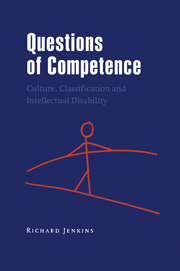Book contents
- Frontmatter
- Contents
- List of contributors
- 1 Culture, classification and (in)competence
- 2 Mental disability in the United States: an interactionist perspective
- 3 (In)competence in America in comparative perspective
- 4 Risk, resilience and competence: parents with learning difficulties and their children
- 5 Constructing other selves: (in)competences and the category of learning difficulties
- 6 Work, opportunity and culture: (in)competence in Greece and Wales
- 7 Slow cookers and madmen: competence of heart and head in rural Uganda
- 8 States and categories: indigenous models of personhood in northwest Greenland
- 9 Learning to become (in)competent: children in Belize speak out
- 10 Towards a social model of (in)competence
- Bibliography
- Index
3 - (In)competence in America in comparative perspective
Published online by Cambridge University Press: 16 January 2010
- Frontmatter
- Contents
- List of contributors
- 1 Culture, classification and (in)competence
- 2 Mental disability in the United States: an interactionist perspective
- 3 (In)competence in America in comparative perspective
- 4 Risk, resilience and competence: parents with learning difficulties and their children
- 5 Constructing other selves: (in)competences and the category of learning difficulties
- 6 Work, opportunity and culture: (in)competence in Greece and Wales
- 7 Slow cookers and madmen: competence of heart and head in rural Uganda
- 8 States and categories: indigenous models of personhood in northwest Greenland
- 9 Learning to become (in)competent: children in Belize speak out
- 10 Towards a social model of (in)competence
- Bibliography
- Index
Summary
As soon as you set foot in America, you feel the presence of an entire continent – space there is the very form of thought.
Jean Baudrillard (1989: 16)It hardly needs saying that the disabled, individually and as a group, contravene all the values of youth, virility, activity and physical beauty that Americans cherish, however little most individuals may embody them.
Robert Murphy (1987: 100)People with disabilities in the United States, in the very way they lead their lives, reveal American culture. Their lives are especially revealing because mental retardation is a highly changeable concept, both historically and cross-culturally, and much of its content is continuously drawn from the dominant culture. This is reflected in language and in its historical change. Since the late nineteenth century, shifts of usage from ‘idiot’, to ‘feebleminded’, to ‘mentally defective’, to ‘mentally subnormal’, to ‘mentally deficient’, to ‘mentally retarded’, to ‘person with mental retardation’, have reflected unease with the connotations of earlier terms, and a never-ending search for the right designation. Michael Angrosino (this volume) points to both the acceptance and the contestation of contemporary classifications, both as labels and bureaucratic processes, and to self-thematisation and concern with personal images, suggesting that no label may ever fit.
My concern here is not to trace the historical development of labels, but to read into contemporary American culture and to understand people with mental retardation as Americans. It is a reading from the inside, using American culture as my starting point, working out towards a cultural understanding of (in)competence.
- Type
- Chapter
- Information
- Questions of CompetenceCulture, Classification and Intellectual Disability, pp. 54 - 75Publisher: Cambridge University PressPrint publication year: 1999



